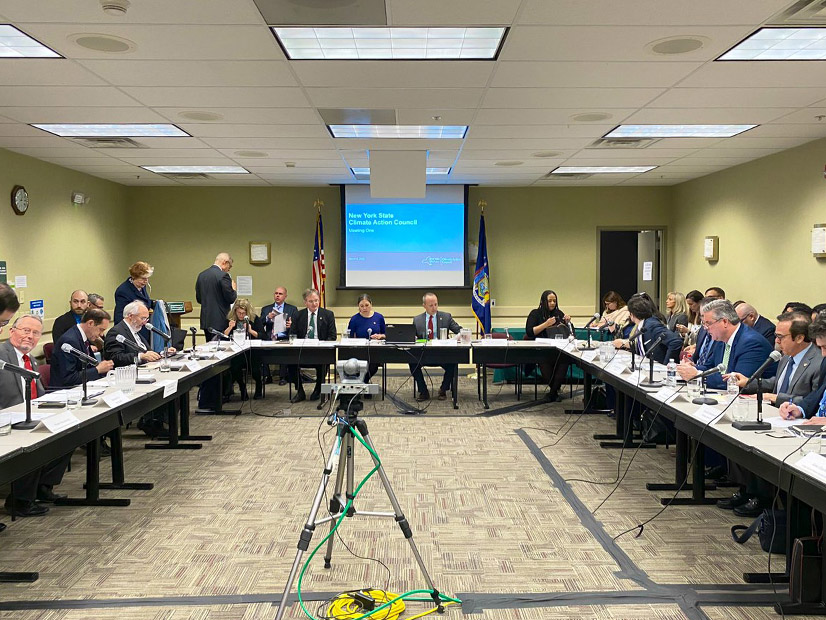The New York Climate Action Council (CAC) on Sept. 13 heard progress reports from three subgroups that will provide recommendations on a final scoping plan to implement the Climate Leadership and Community Protection Act (CLCPA).
In its draft scoping plan, the CAC tasked the three subgroups, Gas System Transition, Alternative Fuels, and Economywide Polices, with studying their critical issues in depth and bringing consensus positions to the council. (See NY Officials Approve Draft Climate Action Plan.)
The Sept. 13 meeting was likely the last opportunity for each subgroup to share their progress before they present their final scoping recommendations to the council for consideration.
Gas System Transition Seeks Clear & Equitable Timelines
The Gas System Transition subgroup, tasked with developing an orderly downsizing of the state’s gas systems, updated the CAC on some of the key considerations that will influence its final recommendations. These included prioritizing continued safety and reliability to disadvantaged communities, ensuring a just and transparent transition of the industry’s workforce, and mitigating both the costs and health burdens to customers as they transition away from gas distribution systems.
The subgroup also plans to develop a detailed timeline to provide clearer guidance on what the gas transition means to consumers and producers.
Alternative Fuels Facilitate Multi-Industrial Transition
The Alternative Fuels subgroup considered how resources such as hydrogen, biofuels and renewable natural gas could decarbonize industrial sectors resistant to electrification.
The subgroup informed the CAC that it focused on identifying how fossil fuels’ capabilities can be replaced without compromising the CLCPA’s goals. The final recommendations are likely to urge New York to be open to new undeveloped fuel technologies and think strategically about how alternative fuels could scale and support industrial reliability and economic development.
The group said strategies should ensure the highest potential for reductions of emissions of GHG and co-pollutants, prioritizing emissions reductions in disadvantaged communities. The plan should prioritize electrification rather than alternative fuel use in such communities, it said.
Maureen Leddy, director of the Department of Environmental Conservation’s Office of Climate Change, discussed how the subgroup identified “rust belt” rural regions that may need significant infrastructure upgrades for electrification. Such communities could benefit from onsite biogas, such as methane, that “can be used locally, if adequate demand and supply is feasible” since this would reduce costs and address peak load constraints by taking pressure off the electric grid.
The Alternative Fuels subgroup also emphasized that “research into undiscovered technologies should be using federal [funds]” and that these projects should “have clear guidelines” on how they will impact economic, societal and environmental sectors.
The subgroup pointed out that it has been working closely with the Gas System Transition subgroup.
Economywide Strategies Evaluates Draft Scope Policies
The draft scoping plan outlined three policies that would help push New York’s economy toward zero emissions: a tax or fee on emissions (carbon pricing); a cap on emissions across the economy, or within particular sectors with an auction mechanism that provides revenue for investment (cap-and-invest); and a clean energy supply standard, which would require fuel providers to reduce their carbon intensity.
The Economywide Strategies subgroup, asked to evaluate those policies, appeared poised to identify key decision-making criteria: ensuring compliance with CLCPA emissions limits; maintaining price stability and affordability; avoiding regressive economic impacts, and prioritizing equitable distribution of benefits to disadvantaged communities.
This subgroup, as with the other two subgroups, will not be making any decisions around which economic policy will be adopted, but will influence the degree, amount, or level to which these policies will be set.
Next Steps
The three subgroups are likely to present their final reports at either the Oct. 13 or 25 CAC meeting.
The CAC also announced that it will be moving to two meetings per month and that future meetings would be held in-person.



